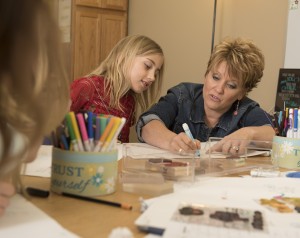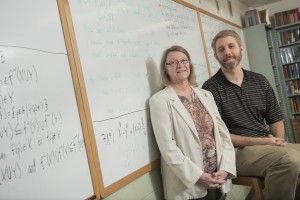
Karen Stuttgen, math intervention teacher at Fall Creek Elementary School, has taken part in math educator initiatives offered by UW-Eau Claire aimed at improving students’ high school math readiness.
As a math intervention teacher in Fall Creek’s elementary school, Karen Stuttgen spends her days helping struggling students achieve grade-level success by first identifying and then working to fill the gaps in their math understanding.
To do her job well, Stuttgen constantly looks for new ways to improve her skills as an educator, specifically looking to more effectively set student learning goals, enhance her teaching skills and better assess student learning.
Stuttgen knows from experience that tapping into the expertise of classroom teachers is an important strategy for building her knowledge and expanding her thinking in ways that will help her better meet the math needs of her students.
“Because I am a specialist working with struggling students, classroom teachers give me a different insight and, likewise, I can share my perspective as an interventionist,” Stuttgen says. “When educators see learning through different lenses like this, we become better teachers.”
Helping K-12 math teachers like Stuttgen build those connections with one another, as well as enhance their teaching and assessment skills, is at the heart of a series of multi-year math educators initiatives led by mathematics faculty at the University of Wisconsin-Eau Claire.
Funded by nearly $1.3 million in Mathematics Science Partnership Grants, the projects aim to improve students’ high school math readiness by bringing together elementary, middle and high school math teachers.

Dr. Chris Hlas and Dr. Sherrie Serros are working with area K-12 teachers to strengthen math education.
The projects — coordinated by UW-Eau Claire math faculty members Dr. Chris Hlas, Dr. Jennifer Harrison, Dr. Sherrie Serros, Dr. Ryan Harrison and Dr. Manjula Joseph — involve more than 150 K-12 mathematics teachers from 15-plus school districts in northwestern Wisconsin.
CESA 10 is a partner in all the projects. One program is administered jointly with UW-River Falls.
Through seminars and workshops held on weekends and during summers over a three-year period, the grant-funded programs are helping mathematics teachers increase their content knowledge, teaching strategies and assessment techniques, as well as build a professional network with other math educators from the region, says Hlas, an associate professor of mathematics at UW-Eau Claire who is a project lead.
Involving elementary, middle and high school teachers in assessing, analyzing and addressing middle school math needs is a way to connect the content needs from elementary school through high school, faculty leaders say.
Learning alongside teachers from many districts and multiple grade levels is a strength of the programs, says Stuttgen. This summer she is working on a project with a fourth-grade classroom teacher from Stanley-Boyd, a collaboration that wouldn’t have happened if she were not part of the math educators’ initiative, she says.
While each of the grant-funded initiatives focus on specific strategies or content areas, they all are designed to help the educators better prepare their students to succeed in math at the high school level, Hlas says.
In the project Hlas oversees, the math teachers learn how to effectively use formative assessments, a tool that allows teachers to adjust their teaching based on assessment data. Teachers collect formative assessment data, classify how their students are doing, and then adjustments are planned based on student learning progressions, he says.
“We hope that teachers are able to use formative assessment probes to evaluate high school mathematics readiness of middle school students,” Hlas says. “Once a teacher understands their students’ misconceptions, then he or she can better understand what should come next to prepare students for high school mathematics.”
Already, Stuttgen says, her involvement in the project has made her a better teacher.
“For me, part of my growth comes from learning from and with other educators,” says Stuttgen, who graduated from UW-Eau Claire in 2008. “Conversations are deep and rich. Activities are meaningful. It’s about what I can take back and use with my students. It’s a huge time commitment but nothing has been a waste of my time, and I always use what I learn for my students. There is so much value in putting into practice what we learn and seeing how students learn.”
Her understanding of assessments and learning intentions are much deeper than before she enrolled in the program, Stuttgen says, noting that she’s already successfully incorporated strategies learned in the program into her teaching.
For example, she learned how a well-written short assessment can help her better assess students’ understanding and pinpoint misconceptions than the longer assessment tools she previously used.
“A quality assessment can show depth of knowledge with just a few questions, but initially those kinds of assessments are very difficult to write,” Stuttgen says. “I learned how the shorter assessments can be effective, as well as how to write them.”
Writing learning intentions — or a brief, written and verbalized daily goal for students’ learning — is another tool she’s already put into practice in Fall Creek, Stuttgen says.
“I knew about learning intentions, but I didn’t know if it would really impact my students,” Stuttgen says. “As a result of this program, I am now writing learning intentions and referring to them daily for my students as I start a lesson and throughout one. I now have students who automatically look at the board for the learning intention, and I feel confident they could go home and share what we are working on because of them.”
While grateful for all that she is taking from the program, Stuttgen says she and the other teachers enrolled in the university-led math educators programs also are giving something back to the faculty who are leading these initiatives.
“I cannot stress enough the importance of UWEC partnerships with K-12 teachers,” Stuttgen says. “It’s important for college professors to learn and see the changes first-hand in today’s classrooms. There are so many changes in education from technology, curriculum to intervention. The needs and diversity of students are so much greater from even five years ago. Professors need to be frequently in classrooms to stay connected with the changes in education. Nothing is stagnant in education. It requires constant learning and growth of all educators.”
UW-Eau Claire already has strong and valuable partnerships with area schools though its student teacher and other programs that bring education students and faculty into classrooms, Stuttgen says.
“It is important for college students to have multiple experiences in today’s K-12 classrooms,” Stuttgen says. “There are times book learning is essential but it’s equally critical that our future teachers have the most experiences they can in the K-12 setting. These experiences will only help them become better teachers.”
Through the grant-funded teacher initiative programs, UW-Eau Claire is expanding those partnerships even more, bringing experienced K-12 teachers into the mix, Stuttgen says.
“In today’s world, we can’t be an island in education, and we cannot be experts on everything,” Stuttgen says of the value of bringing faculty, students and teaching professionals together. “With UWEC partnerships, we connect and learn from each other. With three years of this program, I am excited with what I have learned and the connections I have made with other educators.”
Serros, a professor of mathematics at UW-Eau Claire, works collaboratively with UW-River Falls on one of the initiatives, which is helping prepare teachers to implement the content and practice standards associated with the Common Core State Standards in Mathematics.
“This program is enhancing the learning of mathematics in this corner of the state,” Serros says. “The enthusiasm of teachers enrolling in the program provides for a very productive community of educators. It’s been a pleasure to work with teachers genuinely devoted to the teaching profession and the learning of their students.”
By Judy Berthiaume
